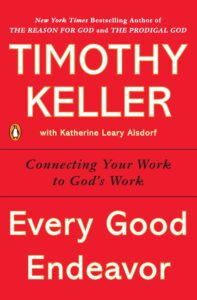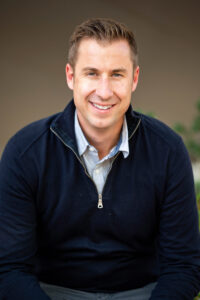Editor's note: This is the third in a three-part blog series exploring "Every Good Endeavor" by Tim Keller and Katherine Leary Alsdorf. The Denver Institute for Faith & Work Book Club will explore books, share ideas, and encourage each other as we integrate our faith and work. Share your thoughts in our private Linkedin Group.

In this final section, the argument Alsdorf and Keller have been building across the book reaches its crescendo. After exploring how the Bible portrays the purpose of work despite the ways in which sin threatens our efforts with futility and frustration, the authors now outline in concrete terms how the gospel equips us to engage our daily work with courage, diligence, and hopefulness. What does it actually look like to integrate faith and work in the world of business, journalism, education, the arts, or medicine? Part III addresses these questions head on.
To begin with, Alsdorf and Keller argue that a Christian will only be able to negotiate the ethical and practical challenges of the marketplace if they are living out of the right story. We all have a worldview, which we might describe as a structure of habits, practices, and desires that governs the way we interact with the world, sometimes unconsciously. The story we choose to live out of makes all the difference for our work. As Alsdorf and Keller write, these narratives “are so foundational to how we think that they determine how we understand and live life itself.”
And here’s why this matters: Christians in the marketplace have to contend against a perfect storm of factors that make it difficult to work with integrity–for example, pressure for profitability in the global economy compounded by a university system that is teaching our students that morality is relative. If Christians are going to resist these pressures, we’re going to need the strong moral compass that the gospel provides, sustained by the power of the Holy Spirit and regular rhythms of deep rest.
At the same time, the Christian worldview also offers a robust view of common grace, which means that Christians can make common cause with their neighbors and colleagues who do not share a common faith, since all people participate in God’s work of preserving the world so that humanity can thrive. “We are likely to be on firm footing if we make common ground with non-Christians to do work that serves the world,” Alsdorf and Keller write. All this means that the Christian will usually experience tension as they fulfill their vocation: there are elements of culture that Christians must refuse (with graciousness and charity), but there is also much that a Christian will affirm in the “secular” world of work.
In this final section of the book, try to think of concrete ways that you can apply this Christian vision of work to your specific context.
Reflection
1. A worldview is not something we look at, but something we look through. In other words, our beliefs are like contact lenses: we can’t see them, but we can’t see without them. Think about the various worldviews that impact your own work experience and your industry.
What stories—including false stories—have you told yourself about the purpose of your work? What story (or stories) is our culture telling about the purpose of work? What parts of these dominant worldviews basically line up with the gospel? What parts are inconsistent with the gospel?
What would it look like for you to inhabit God’s story for work in your daily work?
2. According to Alsdorf and Keller, the gospel offers Christians a strong moral compass for their work, which we’ll need to face pressures, economic or otherwise, in the marketplace and the public square.
How does your industry encourage corner-cutting or underhanded dealing? What are some of the unethical practices common in your industry? Name a time that you’ve succumbed to these pressures.
3. There are many dimensions to integrity in the workplace, but Alsdorf and Keller name a few. Christians should not be ruthless people. They ought to be gracious, generous, poised, and ready to cooperate.
When you consider your own professional life, where is there room for you to improve in these four areas?
4. As Alsdorf and Keller explain, because of the doctrine of common grace—the notion that all humans are created in the image of God and thus all have a role to play in God’s work in the world—Christians ought to be finding common ground with non-Christians for the sake of the common good.
Where is there an opportunity for you to build partnerships with non-Christian neighbors and colleagues to do work which serves the common good?
5. Christians will not be able to live out God’s vision for work in the world if they do not take rest seriously. Without rest, we’ll succumb to fatigue, cynicism, and burnout, but, paradoxical as it sounds, there’s more to it than that: If we will not submit ourselves to the Sabbath command, we actually make ourselves slaves.
What do you think Alsdorf and Keller mean when they characterize a failure to keep the Sabbath as a form of bondage? Conversely, how does the practice of Sabbath offer true freedom?
Our culture is not a Sabbath culture; the work never stops. What practices could you put into place to cultivate a life-rhythm of work balanced by deep rest?
Keep the conversation going! Join us in our private Linkedin Group to share your thoughts.

